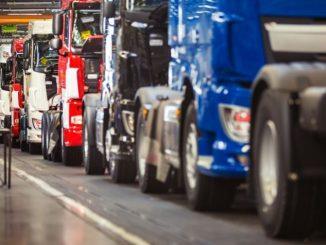
UK van manufacturing grew 16% in the first six months of the year, as 58,675 units rolled off factory lines, according to the latest data from the Society of Motor Manufacturers and Traders (SMMT).
The research showed that the first six months of 2023 marked the best first half year for UK van production since 2011, as supply chain constraints continued to ease. In addition June delivered the third consecutive month of growth, up 23%, with 11,748 units produced.
SMMT also revealed that first half-year production was up 67% on pre-pandemic 2019 volumes, with growth driven by overseas demand.
Exports of the latest British-built CVs rose by 26.7% compared to the same period last year, at 37,803 units.
Overseas shipments represented more than six in 10 (64.4%) of all CVs made since January, with a significant majority (92.8%), shipped into the European Union, followed by America and Asia.
However volumes for the domestic market increased only marginally, with output up 0.5% to 20,872 units in the year to date, with June 2023 volumes in the domestic market falling 3% compared to June 2022, down from 3,999 to 3,878.
Nonetheless, SMMT is predicting that overall growth is set to continue throughout the rest of the year, on the back of new model activity and the planned opening of a new electric van production facility in the North West.
Read more
- UK CV manufacturing delivers best April since 2010, SMMT reveals
- Zero-emission HGV market “shackled” by lack of infrastructure and national plan, SMMT warns
- UK van market sees best February in 25 years, despite fall in BEV registrations, SMMT reveals
It points to data which forecasts light CV production to grow 44.0% to around 114,500 units this year.
SMMT added that volumes are expected to rise again in 2024 to nearly 150,000 units, providing economic conditions allow and there are no hiccups in the UK-EU trading relationship of electric vehicles.
Last month SMMT launched its 'Manifesto 2030: Automotive growth for a zero emission future', setting out five key pledges and policy actions, as part of an industrial strategy to drive UK automotive manufacturing growth and help deliver net zero.
As well as boosting global trade, the plan calls for all political parties to back the industry and address some key competitiveness issues.
These include supporting the upskilling of the workforce as it transitions from making engines to batteries; providing affordable, green energy; driving a healthy electric vehicle market with world-class charging infrastructure; offering incentives and choice; and pulling every lever to bolster investment in automotive manufacturing and its supply chain.
Mike Hawes, SMMT chief executive, said: “Commercial vehicle output has continued to buck the challenging economic conditions, reaching record levels. This is good news for the sector, for jobs and for the wider economy.
“With growth set to continue, and some positive investment announcements into UK auto recently, there is increased positivity within the industry.
“We must now build on this recovery, ensuring we stay competitive and attract more global investment to scale up our EV supply chain and position the UK as a world-class destination for vehicle manufacturing."








![Mercedes-Benz_eActros_600_(1)[1]](https://d2cohhpa0jt4tw.cloudfront.net/Pictures/274x183/8/2/0/17820_mercedesbenz_eactros_600_11_978080.jpg)





